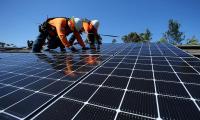India Needs High Growth for Energy Transition: CEA
India's Chief Economic Advisor highlights the need for high economic growth to invest in energy transition and move away from coal to renewable energy, stressing the importance of prioritizing economic recovery.

New Delhi, Dec 6 (PTI) India requires high economic growth to invest in energy transition, Chief Economic Advisor (CEA) V Anantha Nageswaran on Wednesday said, observing that the country needs time to move away from coal to renewable energy.
Addressing an event here, India is well ahead of other G20 countries in meeting the Nationally Determined Contributions (NDCs) target.
"(India) needs high economic growth to invest in energy transition... We basically need the time to move away from coal towards other fossil fuels, and later on towards other renewable energy," he said.
NDCs are national action plans adopted by various countries to limit the earth's average temperature rise to well below two degrees Celsius and preferably to 1.5 degrees Celsius compared to the pre-industrial (19850-1900) levels.
"You will have to use coal for quite some time," he said.
Nageswaran noted that the fear of carbon emissions is driving the West, particularly, Europe towards the impossible trinity of net zero, fiscal prudence and economic competitiveness.
"Now, talking about keeping the temperature increase to 1.5 degrees Celsius below pre-industrial levels...is to impose a huge amount of cost and burden on countries recovering from COVID, struggling with lower growth, higher debt etc," he opined.
Noting that nobody is denying there is global warming, the CEA said it is important to recognise the trade-offs, it is important to recognise prioritisation over different horizons.
Earlier this month, India and China refrained from signing the pledge at the COP28 climate summit to triple the world's renewable energy capacity by 2030, even though New Delhi is already committed to it as part of its G20 presidency.
During the UN's climate talks in Dubai, 118 countries committed to tripling the global renewable energy capacity by 2030 in a highly endorsed initiative.
This ambitious goal aims to reduce the reliance on fossil fuels in the world's overall energy production.
The countries which backed the pledge included Japan, Australia, Canada, Chile, Brazil, Nigeria, and Barbados.
Although China and India have expressed endorsement for the threefold increase in renewable energy by 2030, neither of them formally supported the comprehensive pledge.
This commitment involves scaling up clean power alongside a decrease in the utilisation of fossil fuels.
The pledge called for phase down of unabated coal power and putting an end to the financing of new coal-fired power plants.
Addressing an event here, India is well ahead of other G20 countries in meeting the Nationally Determined Contributions (NDCs) target.
"(India) needs high economic growth to invest in energy transition... We basically need the time to move away from coal towards other fossil fuels, and later on towards other renewable energy," he said.
NDCs are national action plans adopted by various countries to limit the earth's average temperature rise to well below two degrees Celsius and preferably to 1.5 degrees Celsius compared to the pre-industrial (19850-1900) levels.
"You will have to use coal for quite some time," he said.
Nageswaran noted that the fear of carbon emissions is driving the West, particularly, Europe towards the impossible trinity of net zero, fiscal prudence and economic competitiveness.
"Now, talking about keeping the temperature increase to 1.5 degrees Celsius below pre-industrial levels...is to impose a huge amount of cost and burden on countries recovering from COVID, struggling with lower growth, higher debt etc," he opined.
Noting that nobody is denying there is global warming, the CEA said it is important to recognise the trade-offs, it is important to recognise prioritisation over different horizons.
Earlier this month, India and China refrained from signing the pledge at the COP28 climate summit to triple the world's renewable energy capacity by 2030, even though New Delhi is already committed to it as part of its G20 presidency.
During the UN's climate talks in Dubai, 118 countries committed to tripling the global renewable energy capacity by 2030 in a highly endorsed initiative.
This ambitious goal aims to reduce the reliance on fossil fuels in the world's overall energy production.
The countries which backed the pledge included Japan, Australia, Canada, Chile, Brazil, Nigeria, and Barbados.
Although China and India have expressed endorsement for the threefold increase in renewable energy by 2030, neither of them formally supported the comprehensive pledge.
This commitment involves scaling up clean power alongside a decrease in the utilisation of fossil fuels.
The pledge called for phase down of unabated coal power and putting an end to the financing of new coal-fired power plants.
You May Like To Read
TODAY'S MOST TRADED COMPANIES
- Company Name
- Price
- Volume
- Vodafone Idea L
- 8.19 ( -0.49)
- 57919628
- AvanceTechnologies
- 0.64 ( 0.00)
- 25522388
- Standard Capital
- 0.52 ( -3.70)
- 16619978
- GTL Infrastructure
- 1.53 (+ 2.68)
- 15285011
- YES Bank Ltd.
- 17.95 (+ 3.16)
- 12503288






 © 2025 Rediff.com India Limited. All rights reserved.
© 2025 Rediff.com India Limited. All rights reserved.